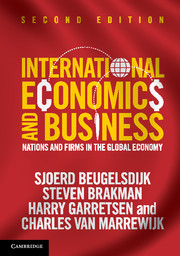Book contents
- Frontmatter
- Contents
- List of figures
- List of tables
- List of boxes
- Preface
- Part I Introduction
- Part II Firms, trade, and location
- 3 Trade, comparative advantage, and competition
- 4 Modern trade theory: the role of the firm
- 5 Trade restrictions and trade policy
- 6 Firms, location, and distance
- 7 Managing across borders
- Part III Capital, currency, and crises
- Part IV Consequences of globalization
- Bibliography
- Author index
- Subject index
5 - Trade restrictions and trade policy
from Part II - Firms, trade, and location
- Frontmatter
- Contents
- List of figures
- List of tables
- List of boxes
- Preface
- Part I Introduction
- Part II Firms, trade, and location
- 3 Trade, comparative advantage, and competition
- 4 Modern trade theory: the role of the firm
- 5 Trade restrictions and trade policy
- 6 Firms, location, and distance
- 7 Managing across borders
- Part III Capital, currency, and crises
- Part IV Consequences of globalization
- Bibliography
- Author index
- Subject index
Summary
Keywords
Tariffs and welfare • Efficiency versus stability • Preferential trade agreement (PTA) • Market-based regulation • Trade policy • Deadweight loss • Most favoured nation (MFN) • Subsidies • Trade creation/trade diversion • Strategic trade policy • Non-tariff measures
Introduction
The policy advice derived from the theories of international trade developed in the preceding chapters is simple: open up the borders! This advice is not based only on the static gains from trade – that is, on the reallocation of production factors to those sectors in which a country has a comparative advantage. It is also a consequence of the dynamic gains from trade arising from the increased competition and R&D investments needed to maintain a competitive edge on the world market. The evidence on the positive effects of trade openness on welfare is strong. As explained in Part III of this book, a similar open-doors policy advice holds in principle for international capital mobility, as free capital flows enable a country to achieve a more efficient allocation of savings and investment and allow for improved risk diversification. But the case for free international capital mobility is less clear-cut than the case for free trade, because free capital mobility might also lead to financial fragility or instability (see Chapters 9–12).
Despite the obvious advantages of free trade flows and a gradual reduction of trade barriers since the 1980s, there are still many policy-induced impediments to trade, such as tariffs, quotas, and minimum standards. In fact, as discussed below, this constitutes the rationale for the existence of the World Trade Organization, as trade impediments are unlikely to be overcome without such institutions. Similarly, the degree of international capital mobility has clearly increased recently (see Chapter 2), although many countries still have capital restrictions in place or consider (re-)installing them when confronted with financial mayhem. The main question we address in this chapter is why trade restrictions exist if theory often dictates that they should not. In answering this question, we may come to a better understanding of the pleas for trade restrictions. We shall conclude that it is by and large welfare-decreasing to give in to these pleas.
- Type
- Chapter
- Information
- International Economics and BusinessNations and Firms in the Global Economy, pp. 132 - 156Publisher: Cambridge University PressPrint publication year: 2013



